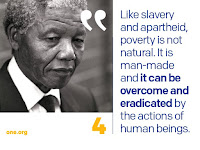Global Poverty Eradication can only be
achieved and maintained with a collective investment to feed the population.
There is an obvious opportunity and a serious need to fuel the human condition;
mental and physical health, religious and social behavior into a skilled and
productive workforce. Nutritious affordable food, widely available, skillfully
processed and scientifically produced, is essential toward achieving
sustainable development. The public health bills, incorporating nutrition and
wellness habits as well as pharmaceuticals and medical treatment, can and must
be reduced through involved policy decisions. The World Food Bank must lead in this effort to negotiate and implement
strategic agreements.
Crop and
livestock farming, fishing, and hunting, sources of food has never change. Crop
farmers are focused on yield per acre, security and quality, time between
harvest, crop availability and pricing. Livestock farmers are also focused on
productivity, the health and safety of the animals, including birds and farm
fish, time to market, meal cuts supply and demand. Fresh raw food catch via
fishing and hunting are more vulnerable to disease and depleting stocks level
due to overfishing and overhunting. Efforts to guide public, private
partnerships, to scientifically produce fresh raw food effectively and
efficiently, is required for profitability and sustainability.
Processing food
and medicine, to meet market demands and feed the world, is where most of
mankind's innovation has and must take place. Biochemists, nutritionists, food
technicians and chefs, are all highly trained and passionately involved in
modifying, combining, preserving and presenting such nutrients for human consumption.
Modifying compounds at a cellular level, combining various raw materials to
address health and wellness issues, packing fresh fruit and vegetables,
developing activity treatments, with minimum side effects, medications, and
basic nutritious cheap fast food, to benefit all people, is the goal. Hence, aiming
the essential future innovation to evolve and ensure populations are well fed
to output the highest levels of energy, leading to enlightenment.
Distribution and
ownership structures of such nutrients to populations, in poverty who cannot
afford current prices, is where most adjustment is needed to meet the ultimate
goal. Clearly, getting fresh and process ingredients, healthy foods and widely
approved remedies, medications to market, at affordable transportation costs, is
crucial. Ownership of food and medicine, at all stages from supply towards
consumption, causes unnecessary price hikes to satisfy shareholders' dividend policies
and promises, instead of managing prices to maintain affordability. The fewer
or one level of ownership, engaging regulations and public share trading
markets, will better control food and medicine cost and prices.
Nutrition, a tasty
healthy economically viable basic public diet, deliver to selected identified
and qualified groups via school feeding, chronic disease and other social programs,
which would reduce poverty and heighten productivity. Foods that are tasty
attractive, appealing and meets all dietary measures, and medications that
address treating and healing needs and, of course, works, purchased in bulk,
prepared and delivered, free to vulnerable persons, by regulated license local
operators. While, ingredients and remedies that are fresh or processed,
transported under temperature controlled condition or using other methods to preserve,
and lands and equipment that are leased or purchased, to maintain economies of
scale, should be all owned by the said population.
Rationale
T.A.J
& Associates Company Limited uses this occasion to
comment on topics that have been covered, both academically and by the
mainstream media, to add its opinion and point out investment opportunity, not
to invoke any social action.

